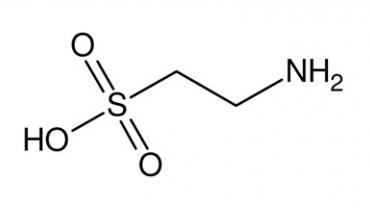
"
Taurine was first discovered and isolated as a constituent in bull's bile hence its name. Taurine is technically not an amino acid as unlike true amino acids it is not incorporated into proteins. It is however classified as a non-essential amino acid as the body creates its own supply. It is one of the most abundant free amino acids in the body and is found in many tissues including skeletal and cardiac muscle and the brain. It is a derivative of the sulfur-based amino acid cysteine.
The primary biological functions of taurine include facilitating the passage of sodium potassium and possibly calcium and magnesium ions into and out of cells and to electrically stabilize the cell membranes. Also taurine is a sulfur-containing compound and is therefore important for phase II detoxification pathways as well as being a key ingredient in the formation of bile acids. The sulfation pathway is responsible for the metabolism of steroidal hormones alcohol a variety of prescription medications and phenolic compounds. It is apparent therefore that increased detoxification demands i.e. high alcohol or medication ingestion can lead to higher taurine needs and possible deficiency.
Taurine has also been associated with regulation of adipose tissue aiding in resting metabolism and energy production which is why many energy drinks include taurine as part of their formulations.
Dietary sources of taurine are meat and seafood especially shellfish such as mussels scallops clams and oysters. Those who do not eat these foods regularly especially vegetarians may be at risk for taurine deficiency. Also a low level of homocysteine cysteine or vitamin B6 is a sign that the body may be having difficulty making taurine. Additionally Cushing's disease has been associated with very low levels of homocystiene and taurine. Cushing's increases the risk of developing coronary heart conditions while supplemental ingestion of or increased urinary excretion of taurine has shown an inverse relationship.
Liver health
As taurine is a major constituent of bile it may make sense that taurine has been shown to be effective and useful in many various aspects of liver health. For instance taurine supplementation was shown to ameliorate liver injury in those suffering with hepatitis and non-alcohol steatohepatitis.
Antioxidative benefits
Taurine has been shown to possess antioxidative properties and has therefore been protective when evaluated in various disease models including studies on myocardial infarct and diabetic complications including improvements in insulin sensitivity and associated hypertension. It appears that taurine exerts its blood pressure-lowering benefits by maintaining nitric oxide levels the body's primary vasodilator.
Hypothyroidism is a condition commonly associated with increased oxidative stress blood lipid dysregulation and an increased risk of atherosclerosis. Paraoxonase is an enzyme that is manufactured in the liver one of its functions being its ability to help prevent LDL oxidation and thus helping to lower the risk of atherosclerosis and coronary artery disease.
In models of hypothyroidism taurine supplementation was shown to increase serum levels of this important enzyme while lowering markers of lipid oxidation and triglyceride levels.
An increase in oxidative stress is a typical response to the glucose dysregulation encountered during diabetes. The trinity of hyperglycemia glycation and oxidative stress increases damage to delicate tissues including nerves kidneys and vasculature. Taurine supplementation in models of diabetes has been shown to improve various aspects of diabetic complications.
Fatty acid absorption
Cystic fibrosis is a condition that among other things affects pancreatic function and consequently fat metabolism and digestion. This condition will then further manifest itself in deficiencies of essential fatty acids and fat soluble vitamins. Addition of pancreatic enzymes to help improve fatty acid absorption has been shown to be inconsistent. Even though the studies are inconsistent taurine use has been shown to improve fat absorption associated steatorrhea and decrease fatty acid deficiency.
Taurine like many compounds demonstrates many more therapeutic and clinically useful properties than what we may be aware of and therefore its use in clinical practice may be greatly underutilized.
by Michael Fuhrman D.C.